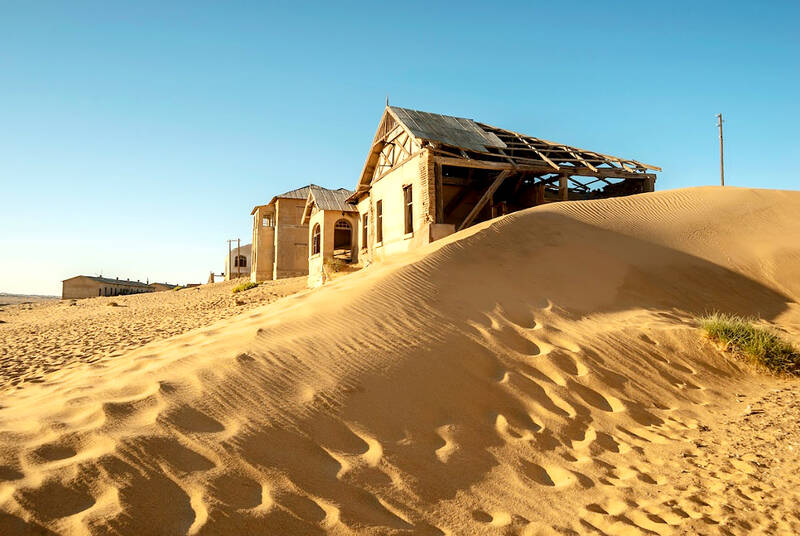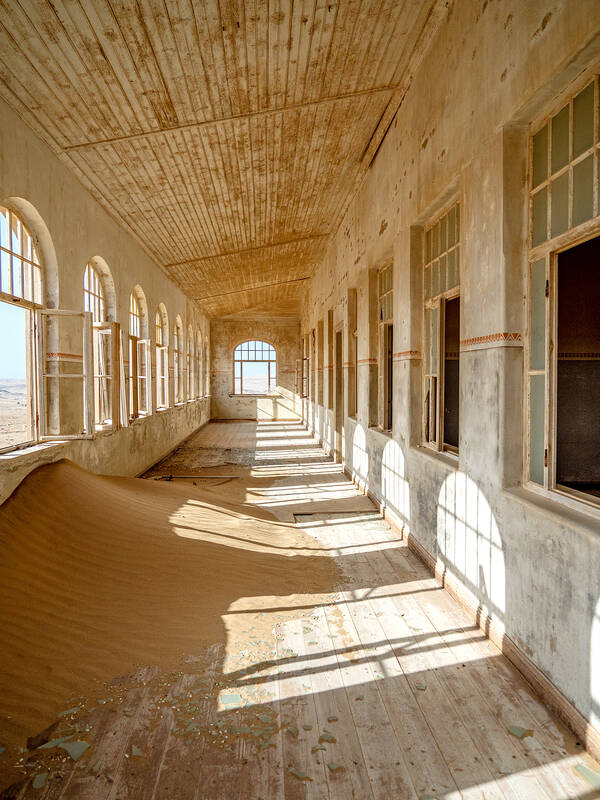Continued from yesterday(延續自昨日)
https://www.taipeitimes.com/News/lang
Like the African town of Kolmanskop, Hashima Island near Nagasaki, Japan, is another abandoned location that has become popular with tourists. Also known as Battleship Island because its shape somewhat resembles a military ship, Hashima was the site of an important coal mine discovered in 1887. It was bought by the Japanese company Mitsubishi in 1890, and after that, many buildings and industries were set up. The population grew as more workers were needed on the small island and reached a peak of over 5,000 in 1959. Today, Hashima is mostly deserted, visited only by tourists and possibly ghosts that many believe represent the memories of Hashima’s dark past.

Photo: AdobeStock I 照片:AdobeStock
Prisoners were forced to work on the island from 1930 to just after World War II. The prisoners referred to the place as Jail Island or even Hell Island due to its harsh conditions. Perhaps because of this history, some believe Hashima is haunted. Fishermen reported sightings of lights going on and off in the old, damaged buildings despite the lack of electricity.
In some ways, what happened to Hashima is similar to the events that occurred in Kolmanskop. In the latter’s case, diamonds became harder and harder to find. As for Hashima, the mines started running out of coal in 1974, causing people to leave the island. Today, both serve as sightseeing locations. Once packed with miners but now silent with memories, these places offer those with a keen interest in the mysteries of the past a glimpse into a forgotten world.
跟非洲城鎮卡曼斯科一樣,日本長崎附近的端島也是另一個在遊客之間很有人氣的廢棄地點。端島因其形狀有點像一艘軍艦,所以也被稱為軍艦島,端島是1887年發現的一個重要煤礦的所在地。其於1890年被日本三菱公司買下,此後設立了許多建築和產業。這座小島需要更多的工人,人口因而隨之增長,並在 1959 年達到了超過五千人的高峰。如今,端島幾乎杳無人煙,只有遊客來訪,以及可能有鬼魂造訪,許多人認為這些鬼魂代表了端島黑暗過往的記憶。

Photo: AdobeStock I 照片:AdobeStock
從1930年到第二次世界大戰剛結束,囚犯被迫在島上勞動。由於環境惡劣,囚犯們稱該地為監獄島,或甚至稱之為地獄島。也許因為這段歷史,有些人認為端島鬧鬼。漁民聲稱,儘管沒有電力,但他們看到了受損的老舊建築中有燈光忽明忽滅。
發生在端島和發生在卡曼斯科的事件在一些方面很相似。在後者的情況中,愈來愈難找到鑽石。至於端島,1974年煤礦開始耗盡,這導致了人們離開該座小島。今日,兩者都成了觀光景點。曾經擠滿了礦工,現在卻沉寂、充滿了回憶,這些地方讓那些對於往日謎團很有興趣的人得以一窺被遺忘的世界。
What Did You Learn?
1. Which phrase in the Day 1 passage means “assemble or reconstruct something by gathering various parts”?(簡答)
2. Based on the information provided, who reported encountering ghosts on Hashima?(簡答)
3. Choose the correct statements about the two abandoned places. (多選題)
(A) Prisoners were once forced to work in both towns.
(B) They have both transformed into tourist attractions.
(C) The Germans controlled them both before World War II.
(D) Efforts are in place to protect the history of Kolmanskop.
(E) Hashima is called Hell Island due to an active volcano there.
(F) Kolmanskop has recently seen a new life thanks to the discovery of an ancient city.
答案:
1. piece together / Piece together.
2. fishermen / Fishermen.
3. (B), (D)
Word in Use
1. location n. 地方,位置
The Great Barrier Reef is a location that supports a variety of ocean creatures.
大堡礁是各種海洋生物賴以維生的地方。
2. resemble vt. 和……相像∕相似
The clouds in the sky sometimes resemble familiar shapes and objects.
天空的雲朵有時跟我們熟悉的形狀和物品很相像。
3. site n. 地點
This park is the site of numerous community events and gatherings.
這座公園是許多社區活動和聚會的所在地。
4. mine n. 礦(井)
With the world’s largest copper mine, the country exports the resource in vast quantities.
那個國家擁有全球最大的銅礦,並大量出口該項資源。
Practical Phrases
1. set up... / set... up 設立……
The company decided to set up a new branch downtown.
該公司決定在市中心設立新的分部。
2. refer to A as B 稱呼 A 為 B
Historians often refer to the medieval period as the Age of Knights.
歷史學家通常將中世紀稱為騎士時期。
3. run out of... 耗盡……
The car ran out of gas and stopped in the middle of the highway.
那輛車沒油了,在公路上行駛到一半時停了下來。
4. serve as... 當作……
The community center can serve as a shelter during emergencies.
那座社區中心可以當作緊急避難所。
5. be packed with... 擠滿……
The concert hall was packed with excited fans.
音樂廳擠滿了興奮的粉絲。
聽文章朗讀及講解: https://ivy.pse.is/455bfu
本文出自常春藤解析英語雜誌: www.ivy.com.tw

In an effort to fight phone scams, British mobile phone company O2 has introduced Daisy, an AI designed to engage phone con artists in time-wasting conversations. Daisy is portrayed as a kindly British granny, exploiting scammers’ tendency to target the elderly. Her voice, based on a real grandmother’s for authenticity, adds to her credibility in the role. “O2” has distributed several dedicated phone numbers online to direct scammers to Daisy instead of actual customers. When Daisy receives a call, she translates the scammers’ spoken words into text and then responds to them accordingly through a text-to-speech system. Remarkably, Daisy

Bilingual Story is a fictionalized account. 雙語故事部分內容純屬虛構。 Emma had reviewed 41 resumes that morning. While the ATS screened out 288 unqualified, she screened for AI slop. She could spot it a mile away. She muttered AI buzzwords like curses under her breath. “Team player.” “Results-driven.” “Stakeholder alignment.” “Leveraging core competencies.” Each resume reeked of AI modeling: a cemetery of cliches, tombstones of personality. AI wasn’t just changing hiring. It was draining the humanity from it. Then she found it: a plain PDF cover letter. No template. No design flourishes. The first line read: “I once tried to automate my

Every May 1, Hawaii comes alive with Lei Day, a festival celebrating the rich culture and spirit of the islands. Initiated in 1927 by the poet Don Blanding, Lei Day began as a tribute to the Hawaiian custom of making and wearing leis. The idea was quickly adopted and officially recognized as a holiday in 1929, and leis have since become a symbol of local pride and cultural preservation. In Hawaiian culture, leis are more than decorative garlands made from flowers, shells or feathers. For Hawaiians, giving a lei is as natural as saying “aloha.” It shows love and

1. 他走出門,左右看一下,就過了馬路。 ˇ He walked outside, looked left and right, and crossed the road. χ He walked outside and looked left and right, crossed the road. 註︰並列連接詞 and 在這句中連接三個述語。一般的結構是 x, y, and z。x and y and z 是加強語氣的結構,x and y, z 則不可以。 2. 他們知道自己的弱點以及如何趕上其他競爭者。 ˇ They saw where their weak points lay and how they could catch up with the other competitors. χ They saw where their weak points lay and how to catch up with the other competitors. 註:and 一般連接同等成分,結構相等的單詞、片語或子句。誤句中 and 的前面是子句,後面是不定詞片語,不能用 and 連接,必須把不定詞片語改為子句,and 前後的結構才相等。 3. 她坐上計程車,直接到機場。 ˇ She took a cab, which took her straight to the airport. ˇ She took a cab and it took her straight